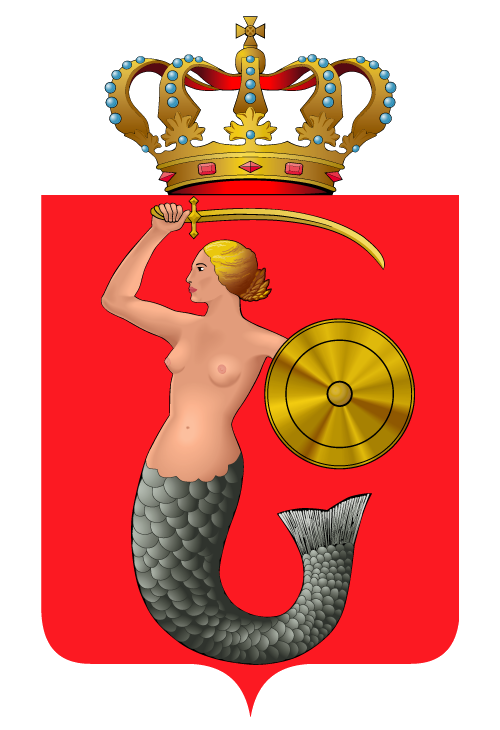This is an old revision of this page, as edited by Caius2ga (talk | contribs) at 00:16, 25 November 2003 (royal coronations). The present address (URL) is a permanent link to this revision, which may differ significantly from the current revision.
Revision as of 00:16, 25 November 2003 by Caius2ga (talk | contribs) (royal coronations)(diff) ← Previous revision | Latest revision (diff) | Newer revision → (diff)
Warsaw (Polish: Warszawa) is the capital of Poland and its largest city. It is located on the Vistula river roughly 350 km from both the Baltic coast and the Carpathian Mountains. Its population as of 1999 was about 1,618,468. The city, also the capital of Masovian Voivodship, is home to many industries (manufacturing, steel, electrical engineering, automotive industry), higher learning institutons (Warsaw University, Politechnical School, Higher School of Business, Medical Academy, etc), a philharmonic orchestra, the National Theatre and Opera.
History
Warsaw was a little fishing village in the 13th century. In time, it became one of the seats of the Dukes of Mazovia. Upon the extinction of the ducal line, the duchy was incorporated into the Kingdom of Poland in 1526. In 1572, Warsaw gave its name to the Warsaw Confederacy, an agreement by the Polish Gentry to tolerate different religious faiths in the Kingdom of Poland. Due to its central location in the Polish-Lithuanian Commonwealth, Warsaw became the capital of Poland in 1596, when King Sigismund III (Vasa) moved the capital from Krakow. Warsaw remain capital of Polish-Lithuanian Commonwealth until 1795, when was annexed by Kingdom of Prussia to become the capital of the Province New East Prussia. Liberated by Napoleon army in 1807, was made a capital of newly created Grand Duchy de Varsovie. After decisions of Vienna congress 1815 Warsaw was the center of the Polish Kingdom, consitutional monarchy under with the personal union with Imperial Russia. Provoked by constant breaking the law by Russians, 1830 November Uprising broke out. However, the Polish-Russian war 1831 ended in the defeat of uprising and illegal limitation of the autonomy of the Kingdom. On February 27, 1861 a crowd in Warsaw protesting Russian rule over Poland was fired upon by Russian troops killing five protesters. Warsaw become the capital of newly independent Poland again in 1918.
Warsaw is notable among Europe's capital cities not for its size, its age, or its beauty but for its indestructibility. It is a phoenix that has risen repeatedly from the ashes. Having suffered dreadful damage during the Swedish and Prussian wars of 1655-56, it was again assaulted in 1794, when the Russian army massacred the population of the right-bank suburb of Praga. In 1943 Jews concentrated by the Nazis in the Warsaw ghetto fought back in the Warsaw Ghetto Uprising. On August 1, 1944, the underground Home Army and the general population started the Warsaw uprising which lasted for 60 days; after it collapsed, the entire city was razed on the order of Adolf Hitler; left-bank Warsaw, controlled by the Nazis, were emptied of its remaining population and the buildings were systematically reduced to rubble by fire and dynamite. In 1945, however, the people of Warsaw, the Varsovians, returned, and the city resumed its role as the capital of Poland and the country's centre of social, political, economic,
scientific, and cultural life. Many of the historic streets, buildings, and churches have been restored to their original form. In 1980, the historic Old Town of Warsaw was inscribed onto UNESCO's World Heritage list.
Historical population
1700: 30,000 (The biggest Polish city of those times were Gdansk 70,000)
1792: 120,000
1800: 63,400
1830: 139,700
1850: 163,600
1882: 383,000
1900: 686,000
1925: 1,003,000
1960: 1,139,200
1970: 1,315,600
1975: 1,436,100
1980: 1,596,100
1990: 1,611,800
2003: 2,269,000
Sights
Coat of Arms
Since the second half of the 18th century, the Warsaw Coat of Arms (originally a siren) has been a mermaid with sword and shield in hand, representing the creature who in legend led a prince to the site of Warsaw and ordered him to found the city. The city's motto is, appropriately, "Contemnit procellas" ("It defies the storms").
The city colours are yellow and red, arranged as two stripes on a flag - yellow on top and red on the bottom.
Administrative districts
Warsaw is divided in 18 distinct entities with their own administrative bodies
- Warszawa-Srodmiescie
- Warszawa-Zolborz
- Warszawa-Mokotow
- Warszawa-Ochota
- Warszawa-Wola
- Warszawa-Praga Poludnie
- Warszawa-Praga Polnoc
- Warszawa-Bialoleka
- Warszawa-Targowek
- Warszawa-Rembertow
- Warszawa-Wawer
- Warszawa-Wilanow
- Warszawa-Ursynow
- Warszawa-Wlochy
- Warszawa-Ursus
- Warszawa-Bemowo
- Warszawa-Bielany
- Warszawa-Wesola
See also
- Warsaw Pact,
- Warsaw Fire Brigade,
- Warsaw Metro
- History of Poland
- Royal coronations in St. John church, Warsaw
Alternative meanings of Warsaw
This page is about the city Warsaw in Poland. There are also:
